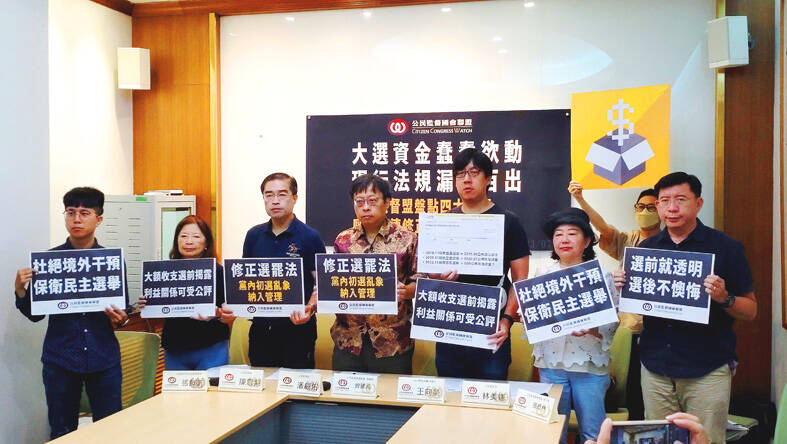Citizen Congress Watch yesterday urged amendments to the Political Donations Act (政治獻金法) to prevent election interference and increase the transparency of cash flows during campaign periods.
The legislative watchdog proposed four amendments, calling on the legislature to make the changes by the end of the upcoming legislative session, which is to run until December, as campaigns for the presidential and legislative elections on Jan. 13 next year have started.
Political donations related to primary elections held by political parties should be regulated by the act, the group said.

Photo: Yang Cheng-yu, Taipei Times
Regulations regarding leaders of recall campaigns and leaders facing a recall should be also included, it said.
Primary elections and recall campaigns are not regulated by the act, which is problematic as it provides opportunities for illegal funds to intervene, Citizen Congress Watch executive director Leo Chang (張宏林) said.
The act is not thorough enough to prevent Chinese funding to from interfering in elections, the group said.
Political donations should be disclosed before the election, instead of up to nine months after the election according to the current act, it said.
Any expense over NT$100,000 should be revealed within two weeks, the group said, calling on candidates to voluntarily disclose income of more than NT$100,000 and expenses of more than NT$50,000 before the amendments are passed.
Citizen Congress Watch chairman Tseng Chien-yuan (曾建元) said that the act is too narrow in scope, so many donations are not regulated.
To avoid public scrutiny, large political donations are often made in China or other countries to avoid records of transactions in Taiwan, he said.
China’s obvious intention to influence Taiwan’s elections, often through incentives such as campaign funds, makes the issue extremely problematic, he added.
No Chinese individual, juristic person, organization or other institution has been punished under the act since the Anti-Infiltration Act (反滲透法) was promulgated more than three years ago, which is hard to believe, Chang said.
Regulations have been ineffective, as there have been many reports of attempts by foreign forces to interfere in Taiwan’s elections, he said.
Many institutions at home and abroad have warned that China would increase its interference in elections, but the regulations regarding election funds are insufficient, he said.
Regulations on political donations should be treated seriously by political parties, as they are related to Taiwan’s national security and election climate, he said.

Taiwan is stepping up plans to create self-sufficient supply chains for combat drones and increase foreign orders from the US to counter China’s numerical superiority, a defense official said on Saturday. Commenting on condition of anonymity, the official said the nation’s armed forces are in agreement with US Admiral Samuel Paparo’s assessment that Taiwan’s military must be prepared to turn the nation’s waters into a “hellscape” for the Chinese People’s Liberation Army (PLA). Paparo, the commander of the US Indo-Pacific Command, reiterated the concept during a Congressional hearing in Washington on Wednesday. He first coined the term in a security conference last

Prosecutors today declined to say who was questioned regarding alleged forgery on petitions to recall Democratic Progressive Party (DPP) legislators, after Chinese-language media earlier reported that members of the Chinese Nationalist Party (KMT) Youth League were brought in for questioning. The Ministry of Justice Investigation Bureau confirmed that two people had been questioned, but did not disclose any further information about the ongoing investigation. KMT Youth League members Lee Hsiao-liang (李孝亮) and Liu Szu-yin (劉思吟) — who are leading the effort to recall DPP caucus chief executive Rosalia Wu (吳思瑤) and Legislator Wu Pei-yi (吳沛憶) — both posted on Facebook saying: “I

The Ministry of Economic Affairs has fined Taobao NT$1.2 million (US$36,912) for advertisements that exceed its approved business scope, requiring the Chinese e-commerce platform to make corrections in the first half of this year or its license may be revoked. Lawmakers have called for stricter enforcement of Chinese e-commerce platforms and measures to prevent China from laundering its goods through Taiwan in response to US President Donald Trump’s heavy tariffs on China. The Legislative Yuan’s Finance Committee met today to discuss policies to prevent China from dumping goods in Taiwan, inviting government agencies to report. Democratic Progressive Party Legislator Kuo Kuo-wen (郭國文) said

The Ministry of Economic Affairs has fined Taobao NT$1.2 million (US$36,900) for advertisements that exceeded its approved business scope and ordered the Chinese e-commerce platform to make corrections in the first half of this year or its license would be revoked. Lawmakers have called for stricter supervision of Chinese e-commerce platforms and more stringent measures to prevent China from laundering its goods through Taiwan as US President Donald Trump’s administration cracks down on origin laundering. The legislature’s Finance Committee yesterday met to discuss policies to prevent China from dumping goods in Taiwan, inviting government agencies to report on the matter. Democratic Progressive Party